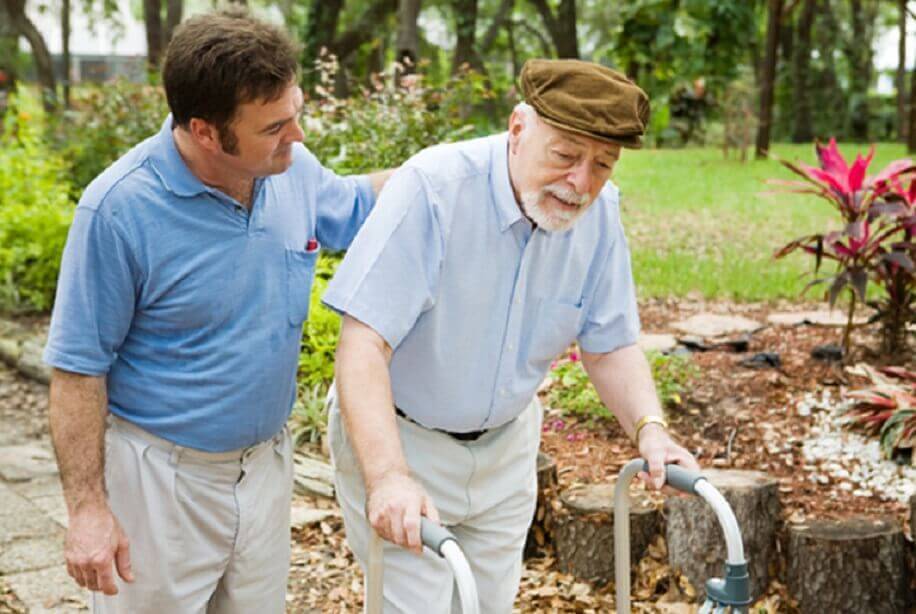I entered the living room and Evelyn was sitting in her regular chair. She was usually looking down the hallway, always attentive to see who was milling about. Typically, she greets staff and residents with a huge smile and finishes it off with a slight giggle. She appears to enjoy coming up with creative ways to compliment people because she never seemed to say the same thing twice. She loves being active, especially working on coloring different pictures. She often points out her art display to anyone entering the community room. She has a great sense of humor and always has a witty comment.
This particular Monday morning, however, Evelyn wasn’t smiling. She wasn’t coloring. She wasn’t attentive. She was sitting in her chair with her eyes closed. Perhaps she was tired, I thought; I know I was. I asked her how she was feeling and she said, “So-so”. “So-so? Me too, I have mornings like that too”, I responded and gave her a big hug. She thanked me, said something sweet under her breath, gave me a polite smile and closed her eyes again.
Later in the morning, one of the CNA’s told me that the team that worked over the previous weekend was not part of the “regular” staff. She told me that they were trying to force Evelyn to do things because they were trying to keep her safe and make sure she ate. For instance, they tried to force her to eat, and that every time she stood up, they were quick to tell her to sit down. Of course their intentions were caring, but the outcome resulted in Evelyn being depressed.
I returned to the living room and approached Evelyn again. This time she was awake, but still wasn’t sporting her genuine smile. I took her hand, gave it a slight squeeze and said, “I heard you didn’t have a great weekend, I am sorry to hear that.” “Yeah”, she muttered, “I don’t really remember what happened, but I don’t want to be pushed around anymore.”
WOW! Not only did Evelyn verbalize why she was upset, she also indicated that she did not want to be in such a situation again! To further highlight how we (people without memory loss) think, read on.
During a recent training of nurses in a local hospital, I explained the function of the brain and the fact that the hippocampus (short term memory) gets damaged very early on and the amygdala (emotional memory) stays intact and is often relied upon even more. One of the nurses exclaimed, “Then I should be nice every time I go into a patient’s room.” She continued, “I always thought they (people with dementia) don’t remember anything, so it didn’t really matter how I acted every time. Now I know they will remember how I treat them.”
I believe that most people do what they think is best or act in a way they think is appropriate. However, the reason that Evelyn had a bad weekend is because she wasn’t treated in a way that made her feel good. The “regular” personnel have all completed our best-care practices training and understand the most effective ways to maximize self-sufficiency and independence for their residents. Instead of forcing Evelyn to eat, they encourage her to eat. Instead of telling her to “sit down”, they ask, “Where would you like to go?” Using this approach, persons with memory impairment experience a sense of control over their own lives (something the rest of us take for granted). When we try to take control, the person with dementia usually responds negatively. This can cause depression, sadness, apathy, agitation, and, at times, even aggression. If poor care practices continue, it won’t be long before the person ceases to engage. In turn, this will cause the inappropriate care strategy to escalate, resulting in a worsening of the person’s negative symptoms.
As the day progressed, Evelyn’s spirit was on the rise. By the time lunch rolled around, Evelyn was back to herself. She commented, “How nice everyone is and how they work so hard to make sure I and the other residents have a nice day.” Evelyn’s negative experience and her quick turnaround, via appropriate care practices, underscore the fact that conventional elder care is not sufficient to meet the challenges of caring for people with memory impairment.
Evelyn’s negative experience is all too common. Let’s strive to make such experiences rare. It doesn’t require more work; it just requires a different approach.





This was such invaluable information. I only wish I had this understanding and particular guidance when I was involved with my Mother’s care 7 years ago. Although she was in an excellent facility of which Kerry was Director, and which gave my Mother first hand experience with Kerry’s understanding and knowledge of dementia and “how it works”, I did not understand as I could have, and wished I did. This information that Kerry has made available thru her book and these blogs is so, so important and I hope that everyone faced with a loved one who is suffering from dementia takes advantage of this wonderful advise and knowledge. I know I did my best based on what I knew at the time, but with this information and support that Kerry provides now, I could have done so much better.
I am so pleased to know that caretakers both professional and family will now have the benefit of this in depth training to better care for and connect with all these fragile souls suffering with this disease.
Keep up the good work Kerry 🙂
Thank you I am a beginner caregiver and this will be a great help.
I, too, wish I had this information when my mother was ill with dimentia. So many of us do not know what to do when this horrible disease defies our usual care. Please, please get this information not only to those professionals who deliver care, but to the rest of us, loving relatives and friends. There must be ways to get help for those who are ill and for those of us caring and/or involved with dimentia.
I had never heard of your strategies, but when I saw your business featured on PBS and it involved caring for Alzheimer’s, I read further. My sweet, wonderful father is in a facility here in FL and has never give anyone trouble in his whole life, but when they try to give him a shower he becomes extremely defensive. So, they avoid it. (not acceptable!) I provided the administrator the link to your business & hope they will train their staff on your methods. Showing love and really trying to understand each one of these patients is crucial. God Bless you for developing this much needed service! RS